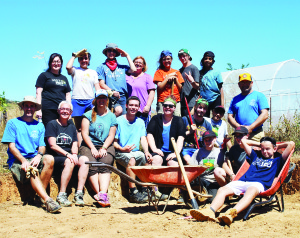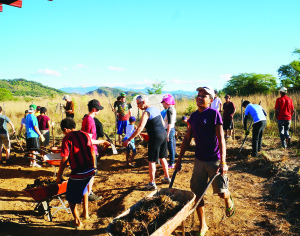|
This page was exported from Caledon Citizen
[ https://caledoncitizen.com ] Export date: Sat Jun 7 19:25:16 2025 / +0000 GMT |
Teens learn a lot building a school in NicaraguaBy Bill Rea It was an experience to remember for the students who took part and their teacher/chaperones from Robert F. Hall Catholic Secondary School in Caledon East. About a dozen of them spent almost two weeks earlier this year helping with the construction of a school in Nicaragua. The trip was made in partnership with Casa Candiense, a Toronto-based non-profit Canadian-Nicaraguan partnership that supports grassroots community development in Nicaragua and seeks to educate Canadian youth about global issues. Considering the weather they left behind to head south, once can easily see the appeal. They found the temperatures down there hovering between 35 and 40 (Celsius), and it was dry. Although they were there to work, the labour was terribly long or heavy. Grade 11 student Caitlin Asmunt said they routinely started work at about 7 a.m., and teacher Glenn MacGowan added they were usually done by 11 or noon. “Then we would do other educational or social things in the afternoon,” he said, adding there were community members working with them, and they had to knock off in the afternoon to go about other chores. They were working in a small village called Jinocuao, which MacGowan said is close to the border with Honduras. The particular project they were on involved the construction of an additional classroom onto a secondary school. None of the contingent qualify as construction workers, but there were enough jobs that needed doing to keep them busy. The tasks included shoveling and moving dirt in wheelbarrows, and leveling the ground so the building work could proceed. Grade 12 student Tyler Hann said they finished that work the last day on the job. Nicaragua is one of the poorest countries in the Western Hemisphere, but there are always people ready to help out. And as the contingent from Hall found out, that help is very much appreciated. And Grade 11 student Sierra Gogol is hopeful they did a good job. The adults in the group agreed the younger folks worked hard, and worked as a team. “They did a wonderful job of working together,” Chaplain Brenda Holtkamp declared. “That's the beauty of it.” She also observed that since they didn't work all day, the hours that they did put in were more intensive. The visitors were put up by host families in the community, and Hann said the reception they received was “amazing.” “They're very kind and welcoming,” he added. “They treated you like you were part of the family.” “Nicaraguans are very warm and generous people,” Holtkamp remarked. “That made it better when we made mistakes with our Spanish.” There were even some occasions when the host families seemed to go above and beyond. Grade 11 student Maria Peppler was among three students in the group staying with one family. “They gave up half of their house for us,” she recalled, adding the three visitors each had their own bed, while the host family of four shared one. The food raised few fusses, as far as the visitors were concerned. Asmunt said it was amazing. “So was the coffee,” she said, adding she was a little disappointed with the coffee she had since she got home. “Rice and tortilla with every meal,” Peppler recalled. Asmunt also mentioned they have very little in the way of utensils. One night, they had chicken, and she was expected to eat it with a spoon. They were in an agricultural area of the country, but the farmers have been struggling with climate change and a drought that's impacted much of Central and South America. MacGowan said there's very little mechanical farming, but plenty of ox carts. There were also lots of things to see in Nicaragua that one is not likely to see in these parts. Peppler said they came across tarantulas, wasps and fighting ants. “It was exciting,” she recalled. Gogol added one girl was stung by a scorpion, but there were no serious problems from that. They also got to see some active volcanos. “They had smoke coming out of them,” MacGowan observed. The poverty they saw was an eye-opener. “They seemed very happy,” Hann recalled. “They know that they're poor, but they didn't seem sad about it.” Holtkamp commented the people there live in a tight and supportive community, and that helps them overcome their lack of material goods. “They really have a deep sense of commitment to each other,” she said. If a mother has to go to town for some reason, she has no trouble finding someone to look after her kids. “They just help each other out.” Holtkamp observed a lot of students have told her “they feel they have new eyes. They see things in a new way. They see the importance of community and family.” Nicaragua is a primarily Catholic country, but Holtkamp said they practise a liberation theology, which is grass roots. They don't have a priest, so lay people run the services and bible studies. Needless to say, those who took part were affected by the experience. “It was an amazing experience,” Gogol said, “and we would recommend it to anybody who's thinking of doing it.” “My Spanish improved a lot,” Asmunt added. And they all want to go back. “I've already started saving,” she said. 
|
|
Post date: 2015-03-27 12:12:53 Post date GMT: 2015-03-27 16:12:53 Post modified date: 2015-03-27 12:12:53 Post modified date GMT: 2015-03-27 16:12:53 |
| Powered by [ Universal Post Manager ] plugin. HTML saving format developed by gVectors Team www.gVectors.com |
